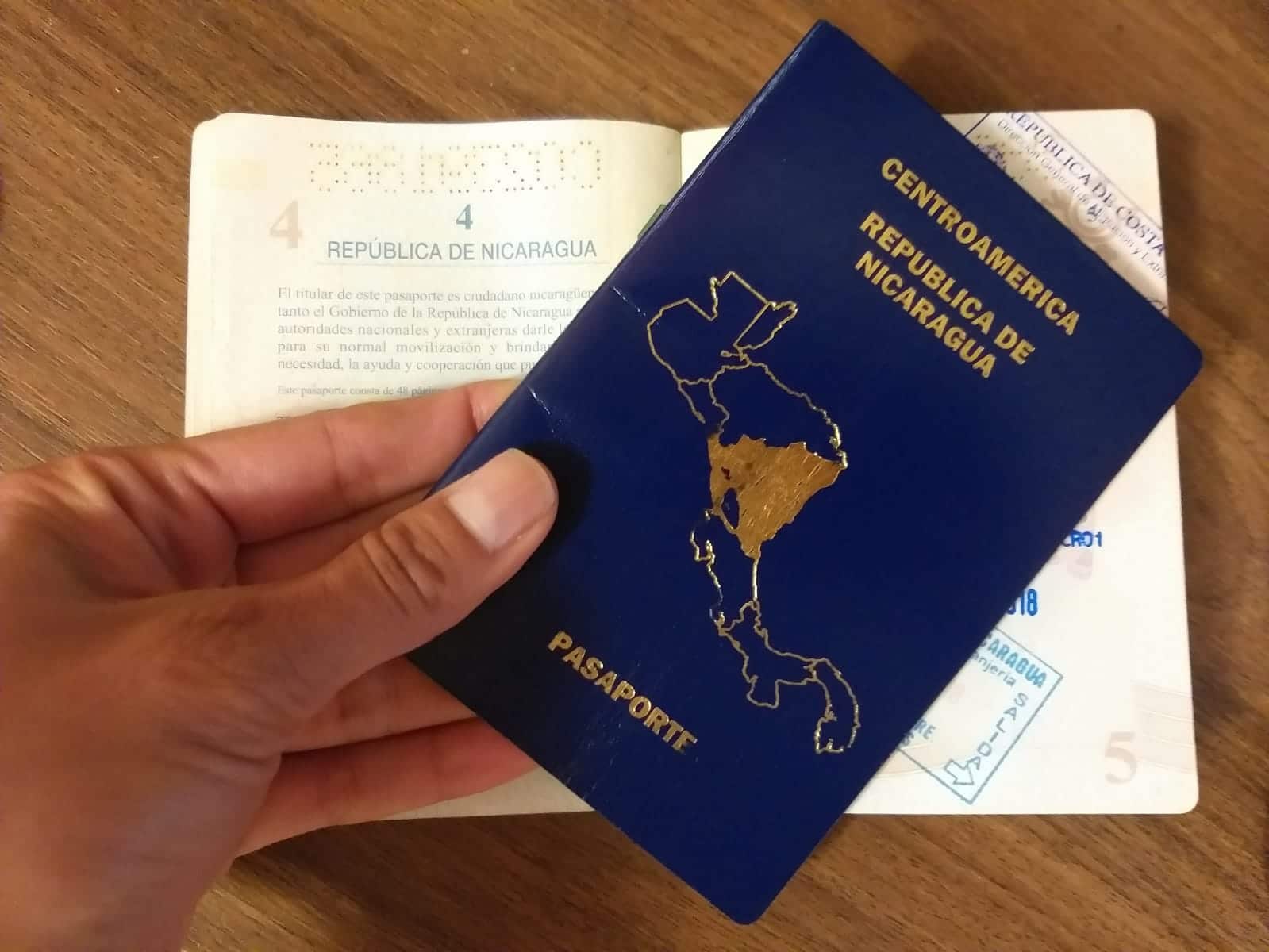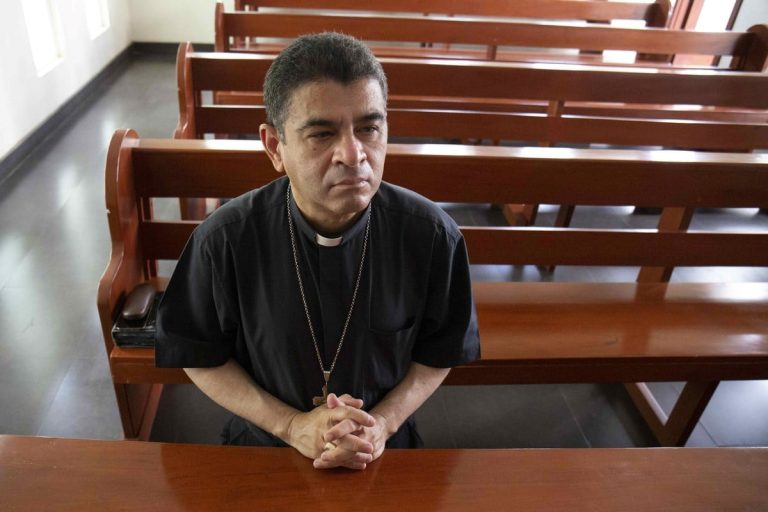6 de agosto 2022

Nicaragua: Public Employees Hindered from Traveling to USA

PUBLICIDAD 1M
PUBLICIDAD 4D
PUBLICIDAD 5D
Daniel Ortega’s Police informed Friday that Monsignor Rolando Alvarez is being investigated for supposedly “organizing violent groups”

Nicaraguan Bishop Rolando Álvarez, in a file photograph. EFE/Jorge Torres
Keeping him inside wasn’t enough. The Police on one side, and the government voices on the other carried out the order of “We’re going in with everything” against Monsignor Rolando Jose Alvarez, who since early on Thursday, August 4, has been under siege. The offices and residency of the Matagalpa Curia are cordoned off by dozens of police and riot squad agents. The religious leader remains locked in there together with five other priests and six lay people. “We’re in God’s hands,” the Alvarez stated at noon on Friday, August 5th.
In a brief press statement, the Ortega Police informed on Friday afternoon that the Bishop is under house arrest, being investigated for supposedly “organizing violent groups” and “executing acts of hate.” “The persons under investigation will remain in their houses,” the police institution affirmed.
Taking their cue from Vice President Rosario Murillo, the Police accused the high authorities of the Catholic Church and the Matagalpa Diocesis – headed by Bishop Rolando Alvarez – “of taking advantage of their condition as religious leaders, utilizing the media and social networks trying to organize violent groups, inciting them to carry out acts of hate against the population, provoking an atmosphere of unease and disorder, affecting the peace and harmony in the community, with the aim of destabilizing the Nicaraguan State and attacking the Constitutional authorities.”
The Police “have opened a process of investigation, with the objective of determining the criminal responsibility of the persons involved in the commission of these criminal acts, regarding which the Interior Ministry and the Judicial Powers have been informed.”
In January 2021, the National Assembly, dominated by the Sandinista Front, approved a reform to Nicaragua’s Penal Code, and the Comprehensive Law against Violence against Women. At the same time, they amended the Constitution to punish “hate crimes” with life in prison. At the time, critics of the Ortega regime predicted that the new law would be nothing more than another legal arm to be used against the opposition.
Similarly, in May 2022, a report came to light through consultations with victims of the repression who at one time were followers of the Ortega regime. The document demanded legal action “with the religious leaders and directors of human rights organizations that were involved in the coup adventure.” Once again, analysts and human rights advocates considered the initiative to be a harbinger of greater repression against the Church and the priests. These had already been victims of multiple attacks.
At the beginning of the civic protests in April 2018, first lady and vice president Rosario Murillo gave the order: “We’re going in with everything.” This translated into the first assassinations of demonstrators. Today, it’s brought an increase in the police siege against Bishop Alvarez and a smear campaign in the regime’s propaganda apparatus, led by Murillo herself. “You can’t seed hate or discord; on the contrary, we must work in peace, with affection, without hate, without wickedness, without bitterness and without poison,” affirmed the first lady, without mentioning the name of Rolando Alvarez, Bishop of the Matagalpa dioceses and also the apostolic administrator of the Dioceses in Esteli.
“The rejection of the person that provokes and the growing rejection towards what we’ve all known throughout our lives as institutions that deserve respect, and to generate discredit towards those institutions that also merit respect, is a crime, it’s a sin against spirituality,” added Murillo in her daily address, which is broadcast over all the government .
The first lady, again without naming names, referred on a second consecutive day to the Matagalpa Bishop. “There are still some people who are buffoons, who make themselves ridiculous, with no moral stature, figures that believe that time hasn’t passed or figures that believe that they can occupy places of authority that perhaps they don’t deserve,” asserted the Vice President after Alvarez came out of the Curia onto the street. The Bishop kneeled on the sidewalk and lifted his hands towards the sky while he received the holy sacrament from a colleague. Then, with the symbol in his hands he walked among the police officials guarding him, praying and begging them to end the intimidation.
In an opinion article published in the regime’s media under the title “That Bishop” Ortega deputy Wifredo Navarro claimed that Alvarez incites “people to violence, disorder, and he already did so in 2018.” Navarro, who was formerly a deputy with the Liberal party before allying himself with the Sandinistas, repeated the line of Daniel Ortega and Rosario Murillo, accusing the priests of being leaders of a failed coup d’etat. A “coup d’etat” is the term the rulers use for the social explosion of 2018 in which the people rose up to demand that the Sandinista Front leave power.
“He [Alvarez], together with other priests, led the failed coup that provoked so much pain and weeping in Nicaragua. He led the coup and on his head is the blood of Nicaraguans, of the police and of the Sandinistas who were killed, due to his incitement to violence and for his political call, because his attitude is and has been eminently political and false,” the deputy declared without any evidence.
In a post on his Facebook profile, another Ortega deputy, Carlos Emilio Lopez, also referred to the priests, stating that there are “shams” who have the “appearance of piety, of docility, of a mystic attitude, but are really bellicose, instigators, fomenters of violence, chaos, discord, conflict and the spiritual and material.”
Navarro, who is known for his confrontive discourse regarding the opposition and the Church said the bishop “isn’t above the law”. “His priest’s robes don’t give him impunity and in addition he has neither morale nor authority to complain because he and other priests are responsible for crimes.”
Murillo also said “flaunting impunity is a crime, especially when what’s being provoked is discord, recklessness.” Navarro, for his part stated that “the priests also participated in the coup but were given amnesty and the amnesty included non-repetition.”
The Ortega regime currently has two priests behind bars, Manuel Garcia and Leonardo Urbina. Both are accused of common crimes; nonetheless their judicial processes have been marked by irregularities according to legal specialists.
Bishop Alvarez celebrated mass on Friday from the Episcopal Curia. In his homily, he reflected: “We, the twelve who are gathered here in the name of God in this chapel of mercy and the Eucharist, and retained here by police forces, from our poor and limited capacities, want to bear this cross and resign ourselves.
“We’re thinking about you, in the people faithful to God… We’re not looking at ourselves, wanting to safeguard ourselves or safeguard our lives. We’re in God’s hands. All twelve of us that are here are conscious that we’re only in his hands, in the hands of the Lord that is All Powerful.”
Monsignor Alvarez recalled that they’re in a crusade of fasting, praying and worship for the Church, the priests and Nicaragua. At the same time, he called upon the people to maintain “alive your hope”, “to remain strong in love and to live in the freedom of the Children of God” with the certainty that “the Lord will restore Nicaragua.”
He also advocated for the need to seek “together, without exclusion, paths of encounter and understanding, where we can sit down at the table and the principal space there is held by the poor, the farmers.” He recalled that despite the circumstances they’re in, surrounded by the Police, they maintain their capacity for dialogue, harmony, understanding and fraternity.
Alvarez informed that while they’re being detained there, up until now without knowing the motives of the police actions, he will celebrate a noon mass and an 8 pm cantata. He thanked the congregation, the parishes, bishops and other instances of the Church that have expressed their solidarity with the situation that he’s experiencing.
“While they continue to detain us here in our Curia, we don’t know how long or the motive, we’ll be celebrating with you every day at 12 noon,” he stated.
The Latin American Episcopal Council (CELAM) expressed its solidarity with the Catholic Church in Nicaragua, joining the suffering “that a large part of the people of Nicaragua and the Church are experiencing,” its faithful and pastors “in the face of the constant harassment they have been suffering from the governmental authorities”.
The siege of priests and bishops, the expulsion of members of religious communities, the desecration of temples and the closure of radio stations “hurt us deeply,” CELAM said in a statement on August 5.
At the same time, they invited the brothers and sisters in Latin America and the Caribbean to join in prayer for the Nicaraguan people, their leaders, authorities, and the Church, since “when a member suffers, all the rest suffer with him,” they said.
“We accompany our brothers and sisters who, through different paths, seek to be the voice of those who have no voice, to build a dialogue capable of charting a path of unity and peace,” the statement read.
The Diocese of Estelí, the clergy of the Diocese of Matagalpa, the clergy of the Diocese of Siuna have also expressed their solidarity with Monsignor Álvarez. Meanwhile, the Episcopal Conference of Nicaragua (CEN) has been silent on the direct aggression against the bishop.
This is the second time that the Ortega regime has imposed a blockade on Bishop Alvarez. Last May, the prelate took refuge in a church in Managua, which was also besieged by the police, and after a few days he managed to get out with the help of a commission of pastors.
Alvarez is one of the most critical voices of the Church, he recently denounced the injustice of the Nicaraguan Institute of Telecommunications (Telcor), for closing ten Catholic stations in the Diocese, arguing that they did not have permission to operate, when the bishop himself had requested it since 2016.
This article was originally published in Spanish in Confidencial and translated by Havana Times
Archivado como:
PUBLICIDAD 3M
Confidencial es un diario digital nicaragüense, de formato multimedia, fundado por Carlos F. Chamorro en junio de 1996. Inició como un semanario impreso y hoy es un medio de referencia regional con información, análisis, entrevistas, perfiles, reportajes e investigaciones sobre Nicaragua, informando desde el exilio por la persecución política de la dictadura de Daniel Ortega y Rosario Murillo.
PUBLICIDAD 3D